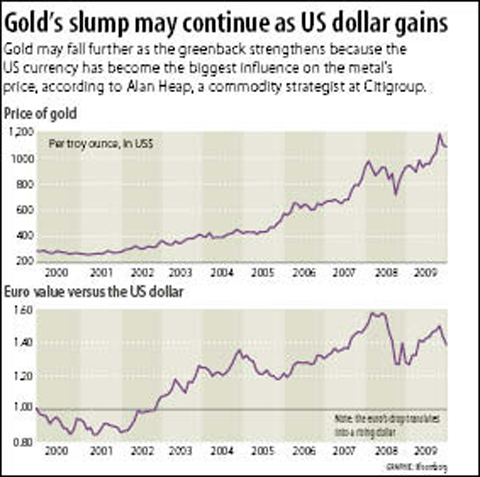Commodity prices slumped this week as confidence in the global economy was shaken by growing fears about soaring European debt and weaker-than-expected US jobs data.
“Commodity markets continue to be held hostage by volatile external markets, dollar fluctuations, shaky sentiment and changing perceptions on the health of the macro-economy,” Barclays Capital analyst Sudakshina Unnikrishnan said.
OIL: World oil prices tumbled as traders took their cue from sliding global stock markets, a stronger US dollar and mounting concerns about a potential sovereign debt default in Europe.

“The price of oil fell ... as traders continued to flee the euro and buy up the US dollar,” ODL Securities analyst Marius Paun said.
“Given the inverse relationship between the dollar and oil, this added some downside pressure but the big story remains the health of the Greek economy. Concerns over sovereign debt have pushed global equity markets lower, which in turn has dented investor confidence in terms of future demand,” Paun added.
The market had nosedived by nearly US$4 on Thursday, mirroring plunging global stock markets, as the US dollar strengthened after a surprise rise in US initial weekly jobless and a deepening debt crisis in Europe.
A stronger US unit makes dollar-priced crude oil more expensive for buyers using weaker currencies — which in turn tends to dent demand and in turn prices.
By late on Friday, New York’s main futures contract, light sweet crude for delivery in March, sank to US$72.80 a barrel from US$74.30 a week earlier.
London’s Brent North Sea crude for March fell to US$71.44 from US$72.84.
PRECIOUS METALS: The US dollar “put downside pressure on gold given the inverse relationship it has with the currency,” ODL Securities analysts said in a research note.
By Friday on the London Bullion Market, gold fell to US$1,058 an ounce from US$1,078.50 the previous week.
Silver dropped to US$15.17 an ounce from US$16.29.
On the London Platinum and Palladium Market, platinum slid to US$1,475 an ounce from US$1,512.
Palladium slipped to US$395 an ounce from US$419.
BASE METALS: Base metals prices “were thrashed again, as a surging dollar and weak US equity prices continue to weigh,” MF Global analyst Edward Meir said. “However, it is the lingering concern about how deeply and quickly China will move on tightening credit that has generated the most angst.”
By Friday on the London Metal Exchange, copper for delivery in three months dropped to US$6,335 a tonne from US$6,820 the previous week.

Authorities have detained three former Taiwan Semiconductor Manufacturing Co (TMSC, 台積電) employees on suspicion of compromising classified technology used in making 2-nanometer chips, the Taiwan High Prosecutors’ Office said yesterday. Prosecutors are holding a former TSMC engineer surnamed Chen (陳) and two recently sacked TSMC engineers, including one person surnamed Wu (吳) in detention with restricted communication, following an investigation launched on July 25, a statement said. The announcement came a day after Nikkei Asia reported on the technology theft in an exclusive story, saying TSMC had fired two workers for contravening data rules on advanced chipmaking technology. Two-nanometer wafers are the most

NEW GEAR: On top of the new Tien Kung IV air defense missiles, the military is expected to place orders for a new combat vehicle next year for delivery in 2028 Mass production of Tien Kung IV (Sky Bow IV) missiles is expected to start next year, with plans to order 122 pods, the Ministry of National Defense’s (MND) latest list of regulated military material showed. The document said that the armed forces would obtain 46 pods of the air defense missiles next year and 76 pods the year after that. The Tien Kung IV is designed to intercept cruise missiles and ballistic missiles to an altitude of 70km, compared with the 60km maximum altitude achieved by the Missile Segment Enhancement variant of PAC-3 systems. A defense source said yesterday that the number of

A bipartisan group of US representatives have introduced a draft US-Taiwan Defense Innovation Partnership bill, aimed at accelerating defense technology collaboration between Taiwan and the US in response to ongoing aggression by the Chinese Communist Party (CCP). The bill was introduced by US representatives Zach Nunn and Jill Tokuda, with US House Select Committee on the Chinese Communist Party Chairman John Moolenaar and US Representative Ashley Hinson joining as original cosponsors, a news release issued by Tokuda’s office on Thursday said. The draft bill “directs the US Department of Defense to work directly with Taiwan’s Ministry of National Defense through their respective

Tsunami waves were possible in three areas of Kamchatka in Russia’s Far East, the Russian Ministry for Emergency Services said yesterday after a magnitude 7.0 earthquake hit the nearby Kuril Islands. “The expected wave heights are low, but you must still move away from the shore,” the ministry said on the Telegram messaging app, after the latest seismic activity in the area. However, the Pacific Tsunami Warning System in Hawaii said there was no tsunami warning after the quake. The Russian tsunami alert was later canceled. Overnight, the Krasheninnikov volcano in Kamchatka erupted for the first time in 600 years, Russia’s RIA